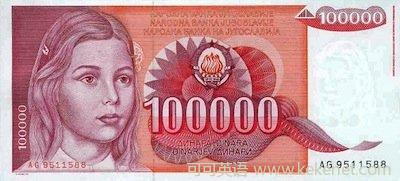Yugoslavia/Republika Srpska: April 1992 - January 1994
Prices doubled every: 34 hours
Story: The fall of the Soviet Union led to a decreased international role for Yugoslavia –formerly a key geopolitical player connecting East and West – and its ruling Communist party eventually came under the same pressure as the Soviets did. This led to a breakup of Yugoslavia into several countries along ethnic lines and subsequent wars over the following years as the newly-formed political entities sorted out their independence.
In the process, trade among regions of the former Yugoslavia collapsed, and industrial output followed. At the same time, an international embargo was placed on Yugoslavian exports, which further crushed output.
Petrovic, Bogetic, and Vujosevic (2012) explain that the newly-formed Federal Republic of Yugoslavia, in contrast with other states that broke away like Serbia and Croatia, retained much of the bloated bureaucracy that existed before the split, contributing to the federal deficit. In an attempt to monetize this and other deficits, the central bank lost control of money creation and caused hyperinflation.

Daily inflation rate: 65 percent
Weimar Germany: August 1922 - December 1923
Prices doubled every: 3 days, 17 hours
Story: The hyperinflation experienced in Weimar Germany in the early 1920s followed its defeat in World War One a few years earlier. As a result of the war, Germany was required to pay large reparations to the victors to make up for the costs incurred by the winning side.
However, Germany was not allowed to pay the reparations with its currency at the time, the Papiermark, which had already weakened significantly during the war on account of the fact that Germany financed its war effort entirely through borrowed funds.
In order to pay the reparations in a currency other than the Papiermark, Weimar Germany was forced to sell large amounts of the mark in exchange for a foreign currencies that were eligible as payments. When the payments came due in the summer of 1921, a policy of selling the mark to buy foreign currencies at any price led to runaway hyperinflation as the mark was severely devalued.

Daily inflation rate: 21 percent
Greece: May 1941 - December 1945
Prices doubled every: 4 days, 6 hours
Story: Greece's fiscal budget balance swung from a 271-million drachma surplus in 1939 to a 790-million drachma deficit in 1940 due to the onset of World War Two (foreign trade fell dramatically). This set the stage for an already-deteriorating fiscal position by the time Greece was invaded by the Axis powers at the end of 1940.
The additional costs on Greece imposed by the "puppet government" of Axis powers that controlled the country during its occupation included supporting 400,000 Axis soldiers stationed there and a big indemnity owed to the occupiers.
Furthermore, national income in Greece was slashed from 67.4 billion drachma in 1938 to 20 billion drachma by 1942. As tax revenues plummeted, Greece resorted to monetization at the central bank to pay the aforementioned expenditures and finance the rest of its deficit.

Daily inflation rate: 18 percent
China: October 1947 - May 1949
Prices doubled every: 5 days, 8 hours
Story: After World War Two, China was divided by civil war. Nationalists and Communists battled for control of the country and introduced competing currencies in the process, leaving China's monetary system fragmented among ten major mediums of exchange in 1948.
Currency took center stage at times during the conflict – Campbell and Tullock (1954) explained that the three governments (including the Japanese occupiers) engaged in "monetary warfare" by attempting to undermine opposing currencies in various ways.
To fund the conflict, the Nationalists resorted to running huge budget deficits, which they eventually looked to cover by printing money, leading to runaway hyperinflation. (this was preceded by abandonment of the silver standard in China in 1935). They even got the Taiwanese central bank involved with the monetization scheme, which caused hyperinflation in Taiwan as well.

Daily inflation rate: 14 percent












